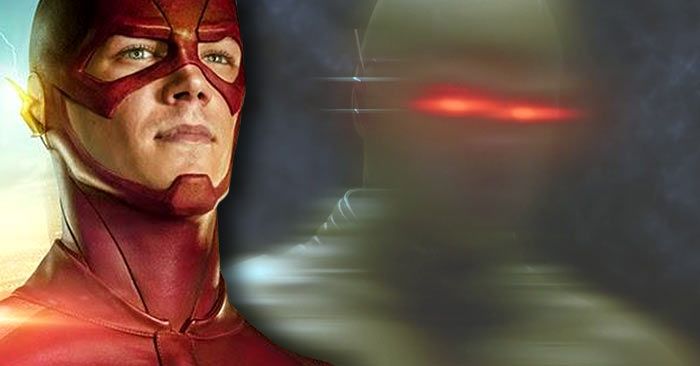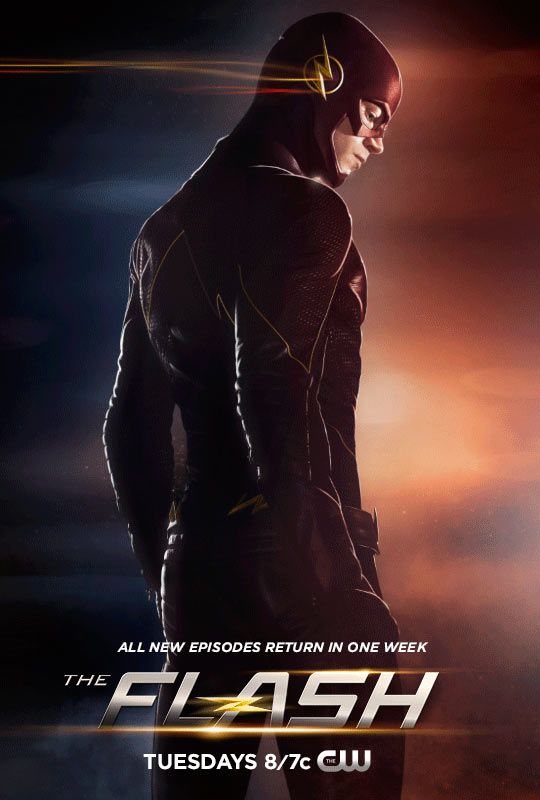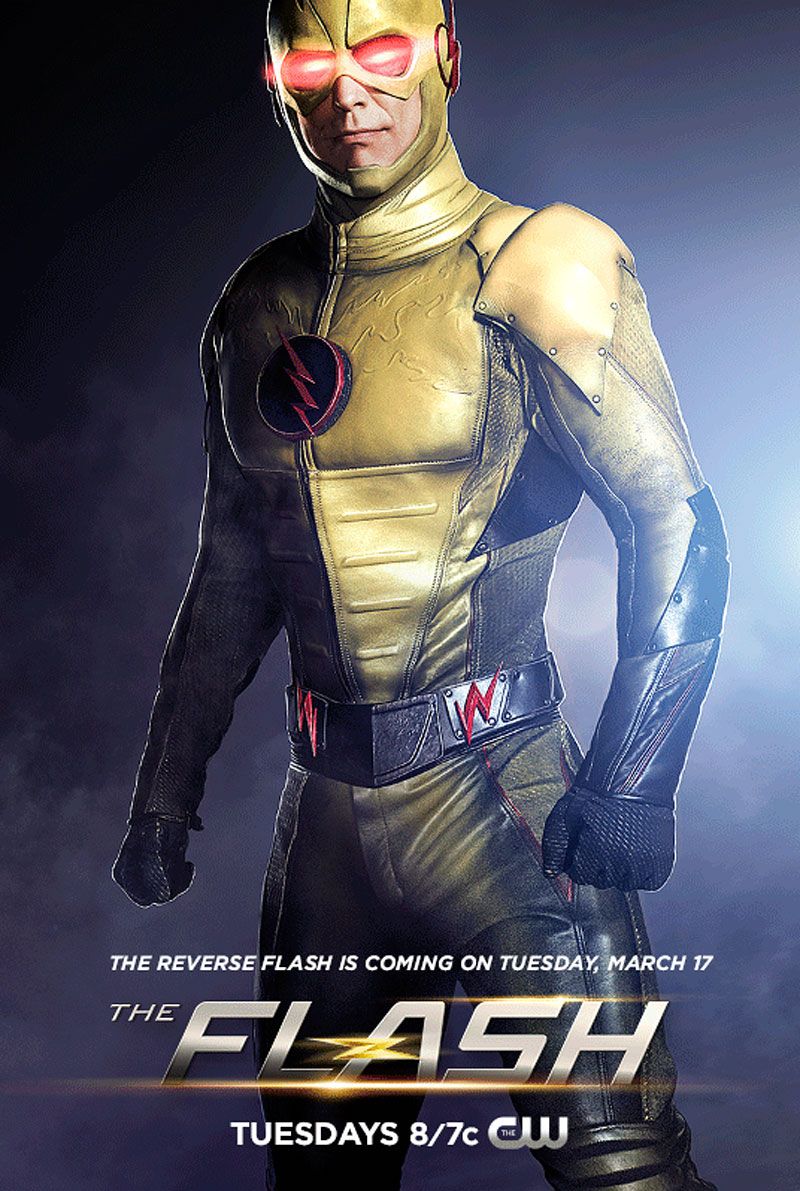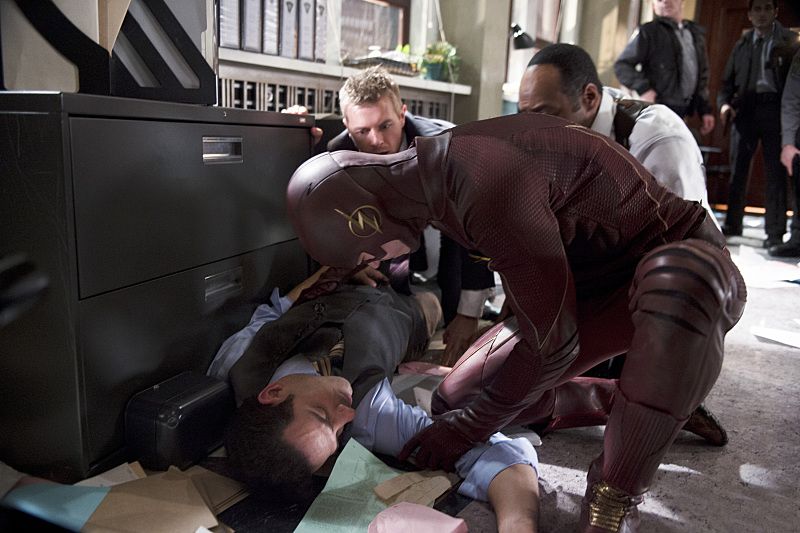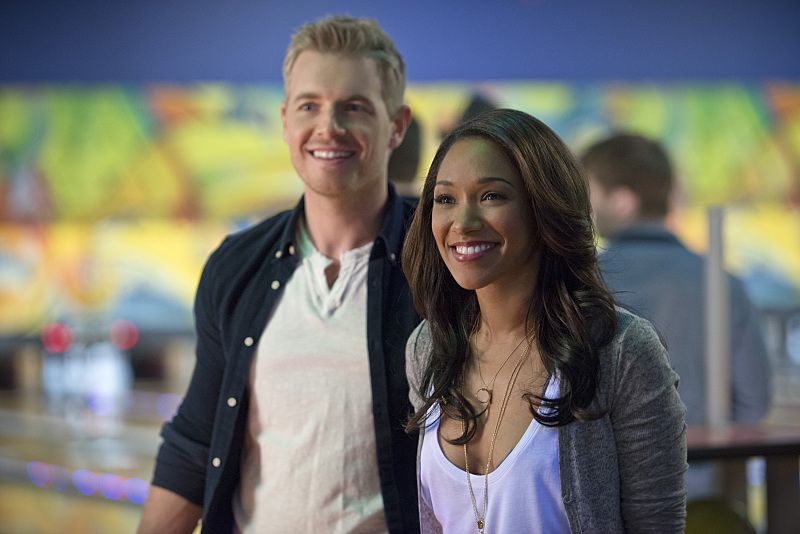[SPOILER WARNING: This article contains major spoilers for this week's episode of "The Flash," "Out of Time."]
"The Flash" returned from a month-long hiatus Tuesday night on The CW with "Out of Time," one of the most plot-packed episodes in the show's already eventful first season. Among the significant developments: a new Weather Wizard (Liam MyIntyre) kidnapping Joe West (Jesse L. Martin), zapping Captain Singh (Patrick Sabongui) with lightning and presenting perhaps the greatest metahuman threat to Central City yet; the revelation that Harrison Wells (Tom Cavanagh) is in fact Eobard Thawne, the original Reverse-Flash from DC Comics and a time traveler from the far-future stuck in the present day; the apparent death of Cisco (Carlos Valdes) at the hands of Wells/Thawne, a kiss between Barry (Grant Gustin) and Iris (Candice Patton) -- and a cliffhanger ending where Barry's speed has the unintended result of time travel, with him landing in the past.
Cavanagh, Patton and series executive producer Andrew Kreisberg joined a group of reporters, including CBR News, earlier this week at The CW to discuss the multiple significant developments of "Out of Time," the Reverse-Flash revelations and how traveling into the past will affect the show going forward.
On the revelation that Harrison Well's true name is "Eobard Thawne" -- and the impact that has on the future of Eddie Thawne (Rick Cosnett):
Andrew Kreisberg: I think you can take him at his word, that there obviously is a family connection between the two of them. There are some great scenes coming up between Tom and Rick that starts to become a storyline.
Tom Cavanagh: I feel like in the pilot, from the moment when you hear "Thawne" for the first time, even the people who are semi-knowledgeable are like, "Ah-ha, here we go." Clearly that's going to be reckoned with at some point. We're getting there.
Kreisberg: There are people who read the comics and know everything, and then there's the people who know nothing, and you have to make the show for both of those people. If we name Eddie "Eddie Thawne," then immediately a whole bunch of comic book fans are going to go, "Obviously, he's the Reverse-Flash." Hopefully they were surprised when that turned out not to be the case. For the people who didn't know the comics, they were just going along for the ride anyway. We're not trying to purposefully trick the comic book fans, but the show has to live on its own, and it has to be for everybody.
On how the audience should feel about Harrison Wells at this point, with much more of his backstory and motivation revealed:
Cavanagh: I think you're going to love him. Just a guy trying to get home. I think you can all appreciate that emotionally.
There are many ways to play a guy that is, from the starting point, already that rich, and already has this many layers. The decision by Andrew and the gang to evolve how we see him, when we're going to see him, and when we're going to find out more about the different sides of his character; always fun to play. But the starting point has always been, he's a guy trying to get home. For me, personally, the starting point has always been as Eobard Thawne. Everything starts there.
Ultimately, he doesn't lie. He almost never lies. He's furthering his agenda, but he's also furthering Barry's agenda, and those two agendas are simpatico. As he's working with them, he's appreciative, it's all that stuff that you see -- it's not a mustache-twirling, villainous starting point. It's actually genuine. We're trying to accomplish something. For the first season, we're accomplishing it together, which makes it, as we see in this episode, a little bit more heartbreaking when the next phase of the plan starts to happen. I think that's just good writing. If he was just a dick the whole time, when he kills Cisco, it'd just be, "I just hate him." But now that we've established that they are kind of a group and kind of a team, to watch that fracture, I find it all the more compelling.
Kreisberg: If one of us was suddenly thrown back many centuries into the past, and it took you 15 years to figure out a way to get home, you wouldn't be sitting there by yourself. You'd meet people, you'd make friends. Even if, intellectually, you were understanding that all of these people have been long dead, and it doesn't really matter to me where I come from, no man is an island. Eobard Thawne himself is not an evil man. He has a reason for doing what he's doing, and he has an agenda. He thinks of himself as the hero. Bad people can love other people. Bad people are capable of love, bad people are capable of incredible amounts of kindness and generosity.
This is the truth. There's nothing he says in that scene with Cisco that isn't the truth. He's sorry he found out. He's sorry it has to happen. But it does have to happen. There's a scene in [next week's] episode 16 which kind of mirrors this scene that I think really speaks to that.
Imagine if one of us was transported back into the past, with no antibiotics, and no Internet, no indoor planning -- these are the kinds of thoughts that he has. Every day in this time is an assault on him. He really is trapped.
On when readers will see more of Harrison's backstory, and the amount of closure viewers can expect by the season finale:
Kreisberg: In episode 17, we're going to get a flashback story from Tom's point of view, which we're really excited about. Then in a future, upcoming episode, we're actually going to have everyone flash back to that time when Barry was in the coma. You'll see that time from Wells' point of view, Caitlin's point of view, Joe and Iris, and get to fill in a little bit more of the backstory.
You guys have seen "Arrow" -- we sort of leave it on the table every season. Towards the end of this season, a whole bunch of new questions will pop up, and that'll drive the series forward, but most of the questions that we proffered at the beginning of the season will be paid off.
Does time travel change Cisco's grim fate?
Andrew Kreisberg: Part of the fun of [episode] 16 is watching how, when time changes, certain events occur that prevent Cisco from following along the the same trajectory. Watching how things play out, but in a completely different way.
On Wells' mindset when killing Cisco:
Kreisberg: I think he felt terrible.
Cavanagh: He's already dead, right? I'm killing a dead guy. Not a big deal. But there is a genuine affection between them that is not fake. When Thawne is in the current time, he's wholly invested, and he truly cares about Cisco, and is truly impressed by him, from the very beginning. He is on his side.
News on the possible superhero future of Cisco Ramon -- who, in the comics, is Justice League member Vibe:
Kreisberg: There's a great line [in episode 22] that speaks to that. Wells begins to impart some tidbits about a certain character's future possibilities.
The show's approach to the "rules" of time travel:
Kreisberg: Like Wells said in a preview episode, there are different versions of time travel. There's the sort of fixed loop, and then there's the version where time is more plastic and mutable. I think one of the fun things is discovering, as always -- like on "Doctor Who" -- what's a fixed point in time and what can't be changed; what things always have to happen, and what things are changeable. It's sort of a mixture of both. ["The Flash" executive producer] Greg [Berlanti] said this the other night -- obviously none of us knows how time travel really works, but we've come up with what we feel like are our rules, and we try to stick by them.
Not to pat ourselves on the back, but a lot of what we're doing now is stuff that is set up in the pilot. You can go back and watch the pilot and go, "Oh, I get it, that's what that stream of things is happening."
On the episode's impact on Iris and Barry's dynamic:
Candice Patton: We'll have to wait to see what the time travel does to all of these characters, including Barry and Iris. But I think what's important about this episode is we learn the answer to the question that Barry asks Iris in episode 9 -- "I feel this way about you, how do you feel about me?" Iris, when she's backed against a wall, and she realizes they could both lose their lives, it propels her to finally come to grips with how she's been feeling about Barry. At the root of how she feels, she loves Barry. And that also makes it very complicated, because she does love Eddie, just in a different way.
And the future of Iris and Eddie's relationship:
Patton: I think their relationship continues to be complicated. I think Eddie will always see there's a relationship between Barry and Iris that he can't compete with to some degree. That's unfortunate, but I think Eddie is strong-willed in keeping Iris in his life. He loves her, he's a good mate for her -- he's kind and loving, he's everything I think a woman would want in a man. And I think Iris knows that. We'll continue to see their relationship blossom, and also have typical relationship falters.
Kreisberg: Eddie and Iris dated for nine months without Barry being around. They've been together for a long time. For Eddie, all of a sudden, this guy appeared back in her life, and it's caused all these problems. I don't think Eddie gets enough credit for being, in some ways, the most emotionally stable. He sees the two of them together, and is like, "Yeah, I'm not good with this." He sees it even if she doesn't. I just think it's sort of fun that the tough, gruff cop is the one who's most in touch with everyone else's feelings.
Given the amount of major developments in the episode, what's left in the race toward the season finale?
Tom Cavanagh: What you've put in the bank beforehand -- that's one of the greatest things about television, as opposed to two hours [for a movie]. We can put 15 hours in prior to this. So we have investment. Then you read something like this, and you get to pay off a little bit. The danger is, you do something like this, and it's a pinnacle, and you slide down. This is not the case. Our season finale is also something to be reckoned with.
Patton: I remember when I read this episode, I was thinking, "Where can we go from here? We've given everything away!" Andrew always says, "Use what you have now, we'll think of new ideas later." I think that's what really great about our show, and this episode. You're watching it, and you're like, "If they're going to do this in episode 15, I can only imagine what the season finale is going to be like." That's exactly how you should feel -- you can only imagine what the finale's going to be like.
"The Flash" airs Tuesdays at 8 p.m. on The CW.

